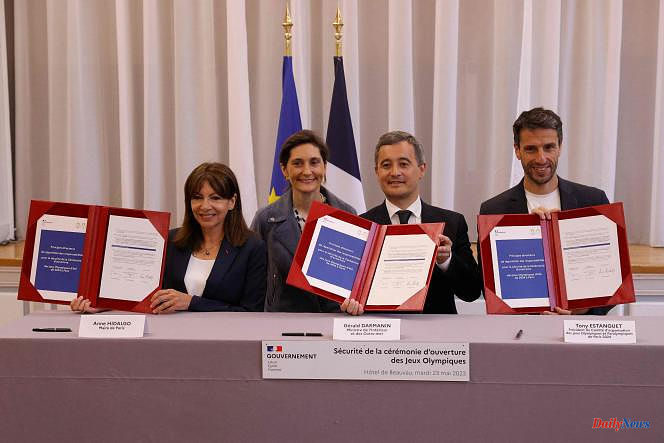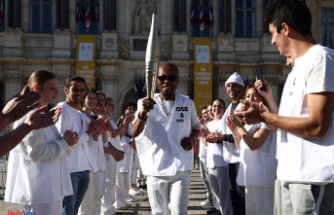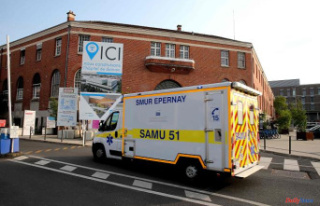Scheduled on the Seine, in Paris, between the François-Mitterrand Library and the Eiffel Tower, the opening ceremony of the Olympic Games, on July 26, 2024 (from 8:24 p.m.), promises to be a huge challenge in terms of security, since around 500,000 people are expected on this occasion over 6 kilometers on either side of the river, not to mention the presence of around 10,000 athletes and many heads of state and government.
In this perspective, after months of discussions - and sometimes tensions between the State and the City of Paris on the sharing of roles - a protocol was signed on Tuesday, May 23, by the Minister of the Interior and Overseas sea, Gérald Darmanin, the Minister of Sports and the Olympic and Paralympic Games (JOP), Amélie Oudéa-Castéra, the Mayor of Paris, Anne Hidalgo, and the President of Paris 2024, Tony Estanguet.
This document establishes "the guiding principles that distribute our responsibilities for securing the ceremony," Darmanin explained. Namely that the State "guarantees the security of the Games", the City of Paris "is the manager of the public space" and Paris 2024 "manages the organization of the sporting event and the course of the ceremony", the latter this should last more than three hours and mobilize 91 boats (plus around thirty safety boats).
“For the party to be beautiful, security must be guaranteed,” said Ms. Hidalgo, adding that the signed protocol reflects the fact that “everyone works in their field of expertise (…) to succeed together” and that it includes “ all the ingredients for success".
Initially, for this first opening ceremony of the Games outside a stadium, the ambition was to bring together 600,000 people: 100,000 on the lower platforms, with paying seats (those which have caused controversy in recent weeks because of of their price, up to 2,700 euros) and 500,000 on the high quays, with free access.
This figure of 600,000 was again mentioned on Tuesday by Mr. Darmain when he was asked about the gauge of spectators. But then he was content to assure that “there will be [it] hundreds of thousands of people on the high quays”. “It will depend on the time, on the publicity you make of it,” he quipped. Ms. Hidalgo and Mr. Estanguet were also not more specific.
The exact figure is not yet decided. For several weeks, certain actors, such as the Ile-de-France region and Ile-de-France mobilities have alerted, considering that such an influx would be complicated to absorb, in particular in terms of transport, and inviting to rely instead on 400,000 people on the high platforms.
In the program Political Questions on France Inter, franceinfo channel 27 and Le Monde, Sunday May 21, Ms. Oudéa-Castéra spoke of "roughly a low water level of 300 to 400,000 places" free.
In the protocol signed on Tuesday, it is specified that the public with free access will be "channeled and installed in boxes delimited by removable barriers" and that "the occupation ratio of the floor area will be set at 3 people per m2" .
Access to the upper platforms will be via a special, free ticket office. This will be implemented by the Ministry of the Interior.
"We will design, develop, finance and organize a secure registration platform," explained Mr. Darmanin. It is a tool that will be essential to regulate all the flows that will concern Parisians and tourists who will see this opening ceremony. »
The opening date of this ticket office has not been specified. The text of the protocol, signed on Tuesday, just mentions that "the specifications for the call for tenders for the creation of this platform will be established by the end of the first half of 2023".
At this stage, it has not yet been formally decided whether or not this device will involve a draw. "The City will ensure the reception of this public," said Ms. Hidalgo.
If it will be enough "to [present] this registration and an identity document" to be able to attend the ceremony, Mr. Darmanin specified that the spectators who come to the quays, in particular the high quays, may be subject to 'screening', i.e. an administrative investigation.
The bill relating to the Olympic and Paralympic Games (JOP) and containing various other provisions adopted on April 12 by Parliament has just authorized such a provision. "In perfect agreement with the CNIL, we will be able to look at who may represent a threat that day," explained the Minister of the Interior.
In addition, Paris has asked the European Commission for an exemption from the Schengen area in order to be able to carry out border controls, the minister stressed.
As he had already declared before the senators, in October 2022, Mr. Darmanin confirmed that the opening ceremony alone should mobilize "nearly 35,000 internal security forces" (police and gendarmes). "This has no precedent in the history of law enforcement," he insisted, adding that there would be "an anti-terrorist perimeter."
To these security forces will be added 2,000 municipal police officers from the City of Paris for the upper quays, as well as "2,000 to 3,000 private security agents" for the lower quays, "under the responsibility of the State, who will oversee all security for the Games and this ceremony,” Estanguet said.
The Trocadéro-Eiffel Tower sector, where heads of state and government will be present, will be "exclusively taken care of" by the internal security forces, specifies the text of the protocol.
Asked about the cost of mobilizing 35,000 security forces on the day of the opening ceremony and about the sharing of the bill between the State and the Organizing Committee, Mr. Darmanin did not give precise answer.
"I can't say for that day," he replied, adding that the security bill for the state "for the whole Games will be 200 million euros".
In a report on the JOP, published in January, the Court of Auditors noted that "the cost of security and the distribution of funding between the public authorities and the organizer [had] not to date been precisely established" .












